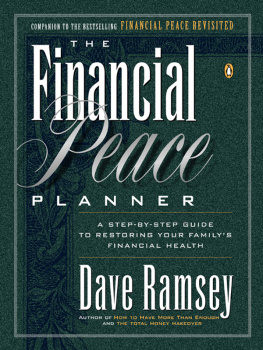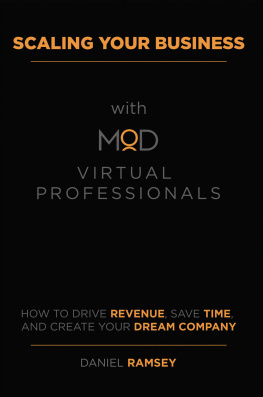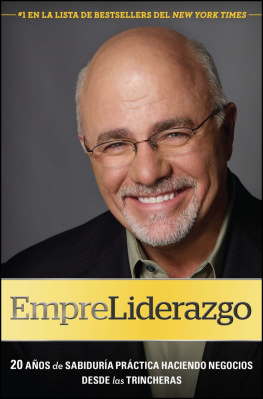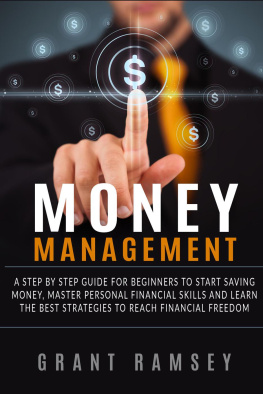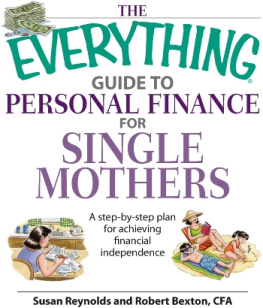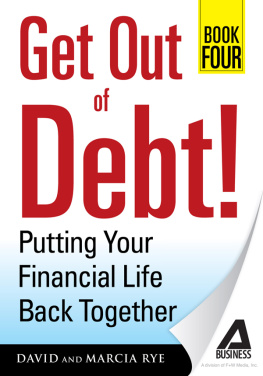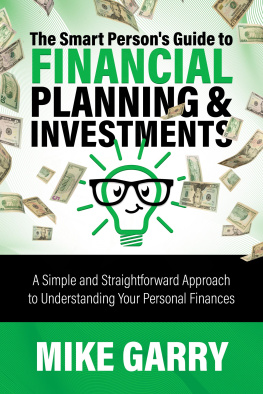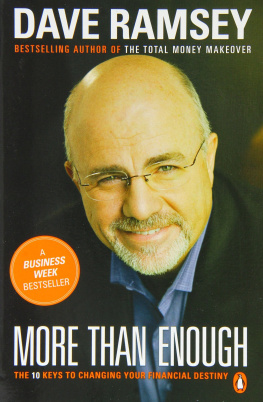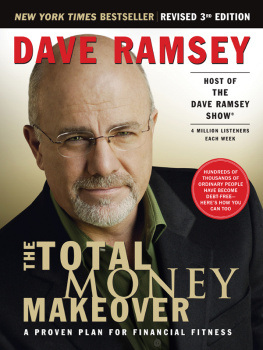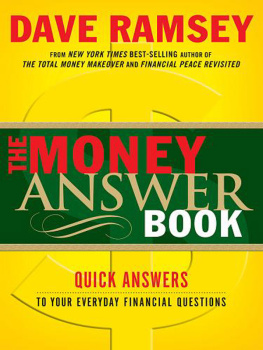IT TAKES THE WORK of many people to complete a book, and to everyone who played a part in the writing of The Financial Peace Planner , I wish to extend my gratitude. In particular, I want to thank Susan Salmon Trotman and Jane von Mehren: You have helped me capture on paper some of lifes most important principles. Thanks to Sara Fortenberry, who helped me learn the ropes of publishing. And as always, I thank God for my beautiful wife, Sharon, and our three children. These principles wouldnt mean nearly as much had my family not stayed committed to me throughout all of lifes hard lessons.
ONE
Call Me WeirdJust Dont Call Me Broke
KIT NERVOUSLY LOOKED around the room as she introduced herself to the fifteen people attending the financial counseling seminar with her. I always paid our bills on time and watched my spending when I was married, she said. Im not really sure why things changed after the divorceI thought I was making pretty good money for someone who hadnt worked in years. But no matter how much I tried to save during the past two years, I just kept sinking a little deeper and a little deeper into debt.
Sitting next to her, Barry nodded. We knew we were in trouble, but we had no idea how bad it was until collectors started calling. Emily and I just looked at each other like, How did that happen?
Its a common cry among people who seek financial counseling: How did that happen? One day everything seems fine; the next day you wake up in debt. Ive got news for you: It didnt happen overnight. It took a while for you to rack up that $30,000-plus of debt. You just werent paying attention while it added up. And Ive got some more news for you: You are going to learn to pay closer attention than you ever have to what you spend and why you spend it. Over the past ten years, I have come to see that financial management is 80 percent behavior and 20 percent know-how. Whether its bad behavior or lack of know-how that got you into trouble, the Financial Peace program will help you correct both. You will get out of debt, stay out of debt, and take control of your financial life. Not only will you be able to have the life you want, youll also be able to retire with dignity and leave a legacy of financial good health to future generations.
Lets start by looking at the 80 percent, your behavior. In the list that follows, check the statements that are true about you:
- I withdraw cash from my ATM machine once or twice a week.
- I have received more than one overdraft notice from the bank in the past year.
- I have been more than thirty days late in paying a bill the last three months.
- I own one or two credit cards.
- I own seven or more credit cards.
- I am maxed out on at least one credit card.
- I pay only the minimum fee on my credit card each month.
- I have less than $1,000 in a savings account.
- I have borrowed money from my parents or friends to pay for clothes, food, transportation, or rent in the last year.
- I havent balanced my checkbook in the past three months.
- A collector or creditor has tried to call me at work or at home about a late payment.
- If I had to buy new tires or the furnace went out, I would have to charge the expense or borrow the money to cover it.
- I have no savings for my retirement.
- I have saved some money in a retirement plan, but I couldnt tell you whats in it.
For every statement you checked, give yourself two points; then, add your total points and find what your score means below:
04 points: The Get-Aheads
You are starting to make it. You have money left over each month after paying bills, but probably you arent sure how to invest it. Sometimes you cant explain where the money has gone and you find yourself saying things like, With what we make and spend, we should be able to save more. With a few tips and some self-control, you will soon see your money explode into wealth.
610 points: The Currents
You are living on the edge. You bring home the bacon each month, and you send it right back out. You have never been late on a payment, but you cant save. So college, retirement, and major purchases all loom as debt looking to happen.
1220 points: The Troubled
Until that unexpected event a few months ago, you were a Current. Now, you are in over your head. You are thirty to sixty days delinquent on your credit cards or house or car payments, and you have begun to get nasty calls. You have considered debt consolidation or other borrowing tactics just to catch up. Stop! It is time to get serious about your debt, but you wont pay it off overnight. Slow down. If you make the right choices now, you can recover financially with little or no damage to your credit.
2228 points: The Desperadoes
You are probably close to giving up. You have thought about the B word (bankruptcy) and possibly discussed it with your spouse or friend. Foaming-mouthed collection monsters call your home every night during supper to threaten foreclosure on your home (if its not already there). You are several months behind on your car payments, making repossession imminent. Even so, credit bureaus are the least of your worries. You would settle for relief from the unending fear and strain.
Wherever you are on this scale, there is hope. Whether you havent learned how to save or cant figure out how to pay off your debt, I can assure you it doesnt take a rocket scientist to manage money well. On the contrary, during the past ten years as I have counseled people on my call-in radio show, The Money Game , at my Financial Peace seminars, and in my office, I have witnessed hundreds of people walk out of financial crisis and onto the road to financial peace by applying the simple principles taught in this workbook.

